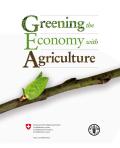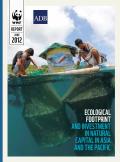
FAO has been examining how the green economy translates into the food and agriculture sector. Greening the Economy with Agriculture (GEA) seeks to contribute to the definition and implementation of the green economy in the context of sustainable development, food security and poverty alleviation through the mobilization of the food and agriculture sector. It analyzes (a) the interactions between the green economy and the food and agriculture sector, including opportunities and constraints; and (b) the bridges among different types of stakeholders and between constituencies, notably between agriculture and environment, while strengthening the overall resilience of countries to exogenous shocks.
The document includes a series of four working papers seeking to support discussions on green economy.
Over the past few years the employment creation potential of activities beneficial to the environment has been receiving increasing attention through the term of ‘green jobs”. These jobs are often understood to be those involving the implementation of measures that reduce carbon emissions or help realise alternative sources of energy use in developed economies. This paper explores the potential for governments to create “green jobs” and align poverty reduction and employment creation in developing countries with a broader set of investments in environmental conservation and rehabilitation to also preserve biodiversity, restore degraded land, combat erosion, and remove invasive aliens etc. In many cases, environmental degradation has a devastating direct effect on the poor, whether they themselves are the main cause of this degradation or not, and indications are that well designed interventions can contribute directly to the poverty-environment nexus by allowing income generated from environmental activities to ease the pressure on generating income through exploiting the environment.
A survey was sent out in August 2011 to 135 United Nations Country Teams (UNCT) to collect information on how the United Nations at the country-level supports Member States to further the Rio+20 themes - green economy in the context of sustainable development and poverty eradication, and the institutional framework for sustainable development.
While many types of activities are being supported, environment seems to be the most frequent point of departure, suggesting more work is needed to ensure a balance among the environmental, social and economic dimensions of sustainable development. A number of suggestions to improve country level service delivery were identified by respondents. Key challenges and gaps that hinder supporting sustainable development themes were also cited.

The widespread loss of natural ecosystems and biodiversity is much more than a conservation issue. Natural ecosystems provide socially and economically valuable services, such as food and fiber resources, clean water and climate regulation, that are fundamental to human welfare, but are often overlooked in decision-making processes.
Produced through a partnership between ADB and WWF International, this report provides examples of promising approaches for sustainably managing natural capital in the region. These are based on experiences from four important regional cooperation initiatives, which demonstrate the commitment of the participating governments to protecting the integrity of natural ecosystems while improving livelihoods and reducing poverty.
This paper firstly reviews the emerging literature on green growth, with a focus on the origin and meaning of the concept, as well as the justifications for and criticisms of the concept. The general idea of taking into account the impact of economic growth policies on the environment is not very controversial, but the possibility of simultaneously achieving conventional GDP growth and environmental protection is debated. It then discusses how China might move on to a green growth path. It summarizes a sizable literature that traces China’s rapid economic growth and the associated environmental problems to its unique and fundamental institutions, and discuss the implications of this on how China might grow more sustainably.
This study shows how transport affects social, economic and environmental sustainability. It deals with issues and best practices for inland transport, namely road, rail, inland waterway and intermodal transport. It also outlines UNECE contributions and reviews progress towards the development of more sustainable inland transport.
This publication suggests solutions that can be built into the design of urban development projects undertaken by the Asian Development Bank (ADB) to address the common problems and grievances of the urban poor, and to improve urban governance overall.
It also identifies successful or promising community-based approaches to dispute resolution that can be useful in urban project design.
It uses ADB's Governance policy as a framework for analyzing key findings of Access to Justice for the Urban Poor, a regional technical assistance grant to four developing member countries in Asia and the Pacific - Bangladesh, Indonesia, the Philippines, and Thailand. The findings consist of case studies illustrating typical problems encountered by the poor in connection with access to urban assets and services, and identifies the types of grievances or disputes that may arise because of these issues. The publication reproduces key case studies to illustrate significant concepts.
Over the past decade, Asia and the Pacific has made significant progress in achieving the Millennium Development Goals. However, accelerating climate change is threatening to reverse these gains, and those who are already economically and socially vulnerable are likely to suffer soonest and most. To enable member countries cope with the inevitable impacts already locked into the climate system, as well as to transition them to low-carbon economies, ADB is working with urgency to put in place integrated solutions that will address both the causes and consequences of climate change in the region.
In 2009 to August 2011, ADB’s climate change-related interventions span a total of more than 110 projects, involving an investment of about $10 billion. During the same period, ADB has also provided more than $245 million in technical assistance to improve knowledge and capacities, support policy and institutional development, and ensure the feasibility of investments related to climate change.
This report captures the mission and actions of the Asia Solar Energy Initiative (ASEI), launched by Asian Development Bank (ADB) in May 2010, in response to the exponential growth opportunities to install solar energy capacity in Asian and Pacific.
The report provides information to relevant stakeholders on the importance and benefits of developing the solar energy sector in Asia and the Pacific, investment opportunities and challenges in the sector, and the approach adopted by the Asia Solar Energy Initiative to facilitate the rapid deployment of solar energy applications in the region, including knowledge management, project development and innovative finance.
